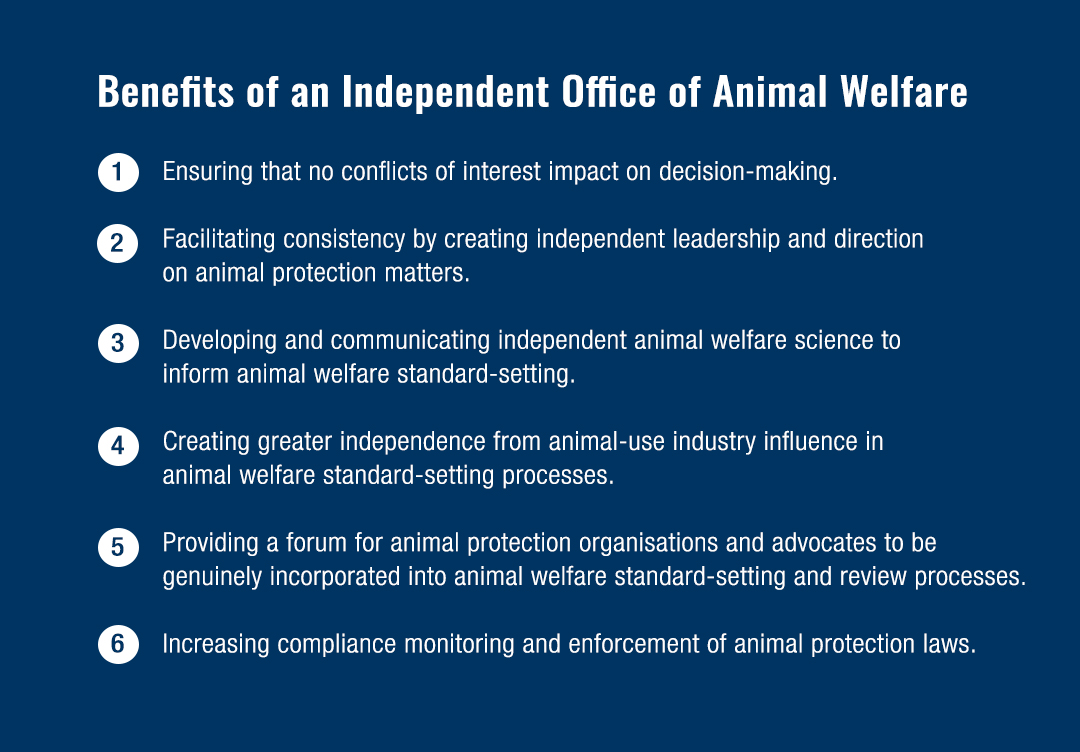WHAT IS AN INDEPENDENT OFFICE OF ANIMAL WELFARE?
In Australia, responsibility for animal welfare is usually delegated to government departments governing the regulation of primary industries and agriculture. This means that the same government departments who regulate recreational hunting, commercial fishing and animal agriculture also regulate animal welfare.
Accordingly, they are required to both protect animal welfare and promote and regulate animal-use industries.
Various commentators (such as Goodfellow) have argued that performing this dual function potentially creates a conflict of interest, as sometimes pursuing profitability for animal agriculture may conflict with ensuring certain standards of animal welfare.
A number of animal protection organisations (including Voiceless), animal lawyers and political parties have advocated for a particular solution to this issue – the creation of independent offices of animal welfare.
Although different models of the reform have been proposed, they hold in common the goal of transferring governance of animal welfare from government departments regulating animal agriculture to independent agencies at both the state/territory and Commonwealth level.
HOW WOULD AN INDEPENDENT OFFICE OF ANIMAL WELFARE OPERATE?
The operation of independent offices of animal welfare would depend on their construction under the law.
Voiceless believes that ideally a national independent office of animal welfare would be responsible for the following:
- Providing balanced advice to government on animal protection issues;
- Co-ordinating the development and implementation of animal protection standards, including the Australian Animal Welfare Standards & Guidelines;
- Facilitating input from a balanced and diverse range of stakeholders in the standard-setting process, including from animal protection groups and independent animal welfare experts;
- Commissioning internationally recognised and impartial animal welfare science to inform the development of animal protection policies, laws and standards;
- Standardising the various state and territory animal protection frameworks;
- Monitoring and enforcing animal protection laws within the Office’s jurisdiction, such as overseeing the live animal export regulatory regime at a federal level;
- Facilitating and coordinating the implementation of similar Offices in each state/territory jurisdiction.
IMPROVEMENTS FOR ANIMAL PROTECTION
Australia was one of the worst ranked countries in the 2017 Voiceless Animal Cruelty Index, and received a D grade in the 2020 World Animal Protection Animal Protection Index.
Below are the various possible ways the introduction of independent agencies governing animal welfare could improve animal protection in Australia.

IS AUSTRALIA LIKELY TO INTRODUCE OFFICES OF ANIMAL WELFARE?
The establishment of a federal independent office of animal welfare has already received political support from the Australian Labor Party, the Australian Greens, and the Animal Justice Party.
This political support reflects community support for the reform. A 2016 national survey found that most Australians would be more likely to vote for a candidate who supported the establishment of an independent body to improve standards of animal welfare at a national level. A further 84% of Australians believed that the Federal Government should set goals for animal welfare and have a plan to meet them.
Precedent also exists for the establishment of similar statutory bodies in other jurisdictions, with expert and independent animal welfare advisory bodies already operating at a national and supranational level in New Zealand, the United Kingdom, Canada and the European Union.
In 2015, the Australian Greens introduced into federal parliament a bill seeking to establish an independent office at the national level. The bill was the subject of a senate inquiry, which ultimately recommended against adoption of the bill largely on the grounds that the Committee was of the opinion that the ‘substantive functions’ of the proposed office were ‘already achieved through existing mechanisms’. The Australian Government accepted the recommendation, viewing the proposal as costly and unnecessary. The bill has since lapsed.
In 2016, the Productivity Commission conducted an inquiry into the regulation of Australian agriculture, recommending that ‘the process for setting standards would be improved through the creation of a statutory agency responsible for developing national farm animal welfare standards using rigorous science and evidence of community values for farm animal welfare’.
The Commission considered various options for implementation, ultimately concluding that the most effective approach would be to establish an independent statutory agency, known as the ‘Australian Commission for Animal Welfare’ (ACAW), with responsibility for developing national standards of animal welfare. They envisaged that ACAW would advise on ‘best-practice farm animal husbandry practices’, with advisory committees providing ‘independent and rigorous evidence on animal welfare science and community values’.
The Australian Government responded in 2019, stating that ACAW would constitute ‘a significant shift from the current division of responsibilities between the Australian Government and the states and territories’, and that they were not convinced that the Commission had established that ACAW would have a ‘viable role’ to play.
Although ACAW has not been established, the Commonwealth Government has created a new independent entity in the animal welfare space, with the recent introduction of the Inspector-General of Live Animal Exports. The Inspector-General is tasked with reviewing the performance and exercise of powers by the Department of Agriculture, Water and the Environment in live export regulation.
Introducing independent oversight over live export regulation was one of the key functions of the independent office proposed by the Australian Greens in 2015, meaning that one element of the reform has been realised to some extent.
With significant political and community support, and a Productivity Commission recommendation in its favour, it seems very plausible that an independent office of animal welfare will be established at some point in the future.
LEARN MORE
- Read the Voiceless submission on the Voice for Animals (Independent Office of Animal Welfare) Bill 2015.
- Read our Hot Topics pages discussing numerous animal welfare issues in Australia.
- Watch the 2016 Voiceless Animal Law Lecture Series.
Last updated April 2020

